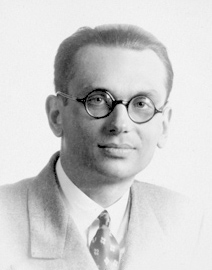Mathematical logic really refers to two distinct areas of research:
the first is the application of the techniques of formal logic to
mathematics and mathematical reasoning, and the second, in the other
direction, the application of mathematical techniques to the
representation and analysis of formal logic.[27]
The earliest use of mathematics and geometry in relation to logic and philosophy goes back to the ancient Greeks such as Euclid, Plato, and Aristotle.[28] Many other ancient and medieval philosophers applied mathematical ideas and methods to their philosophical claims.[29]
One of the boldest attempts to apply logic to mathematics was undoubtedly the logicism pioneered by philosopher-logicians such as Gottlob Frege and Bertrand Russell: the idea was that mathematical theories were logical tautologies, and the programme was to show this by means to a reduction of mathematics to logic.[8] The various attempts to carry this out met with a series of failures, from the crippling of Frege's project in his Grundgesetze by Russell's paradox, to the defeat of Hilbert's program by Gödel's incompleteness theorems.
Both the statement of Hilbert's program and its refutation by Gödel depended upon their work establishing the second area of mathematical logic, the application of mathematics to logic in the form of proof theory.[30] Despite the negative nature of the incompleteness theorems, Gödel's completeness theorem, a result in model theory and another application of mathematics to logic, can be understood as showing how close logicism came to being true: every rigorously defined mathematical theory can be exactly captured by a first-order logical theory; Frege's proof calculus is enough to describe the whole of mathematics, though not equivalent to it. Thus we see how complementary the two areas of mathematical logic have been.[citation needed]
If proof theory and model theory have been the foundation of mathematical logic, they have been but two of the four pillars of the subject. Set theory originated in the study of the infinite by Georg Cantor, and it has been the source of many of the most challenging and important issues in mathematical logic, from Cantor's theorem, through the status of the Axiom of Choice and the question of the independence of the continuum hypothesis, to the modern debate on large cardinal axioms.
Recursion theory captures the idea of computation in logical and arithmetic terms; its most classical achievements are the undecidability of the Entscheidungsproblem by Alan Turing, and his presentation of the Church-Turing thesis.[31] Today recursion theory is mostly concerned with the more refined problem of complexity classes — when is a problem efficiently solvable? — and the classification of degrees of unsolvability.[32]
The earliest use of mathematics and geometry in relation to logic and philosophy goes back to the ancient Greeks such as Euclid, Plato, and Aristotle.[28] Many other ancient and medieval philosophers applied mathematical ideas and methods to their philosophical claims.[29]
One of the boldest attempts to apply logic to mathematics was undoubtedly the logicism pioneered by philosopher-logicians such as Gottlob Frege and Bertrand Russell: the idea was that mathematical theories were logical tautologies, and the programme was to show this by means to a reduction of mathematics to logic.[8] The various attempts to carry this out met with a series of failures, from the crippling of Frege's project in his Grundgesetze by Russell's paradox, to the defeat of Hilbert's program by Gödel's incompleteness theorems.
Both the statement of Hilbert's program and its refutation by Gödel depended upon their work establishing the second area of mathematical logic, the application of mathematics to logic in the form of proof theory.[30] Despite the negative nature of the incompleteness theorems, Gödel's completeness theorem, a result in model theory and another application of mathematics to logic, can be understood as showing how close logicism came to being true: every rigorously defined mathematical theory can be exactly captured by a first-order logical theory; Frege's proof calculus is enough to describe the whole of mathematics, though not equivalent to it. Thus we see how complementary the two areas of mathematical logic have been.[citation needed]
If proof theory and model theory have been the foundation of mathematical logic, they have been but two of the four pillars of the subject. Set theory originated in the study of the infinite by Georg Cantor, and it has been the source of many of the most challenging and important issues in mathematical logic, from Cantor's theorem, through the status of the Axiom of Choice and the question of the independence of the continuum hypothesis, to the modern debate on large cardinal axioms.
Recursion theory captures the idea of computation in logical and arithmetic terms; its most classical achievements are the undecidability of the Entscheidungsproblem by Alan Turing, and his presentation of the Church-Turing thesis.[31] Today recursion theory is mostly concerned with the more refined problem of complexity classes — when is a problem efficiently solvable? — and the classification of degrees of unsolvability.[32]


No comments:
Post a Comment